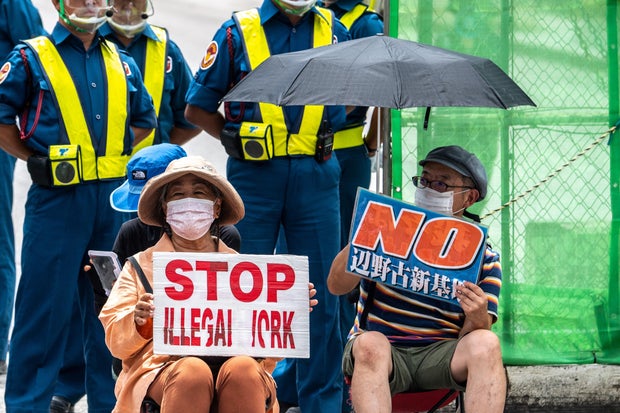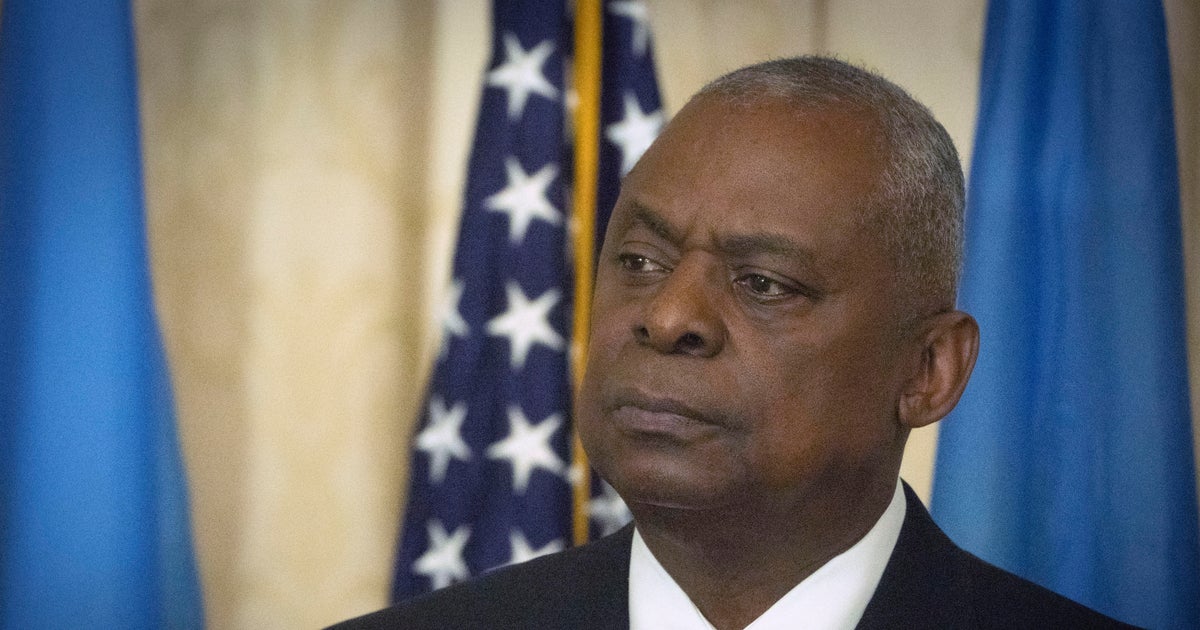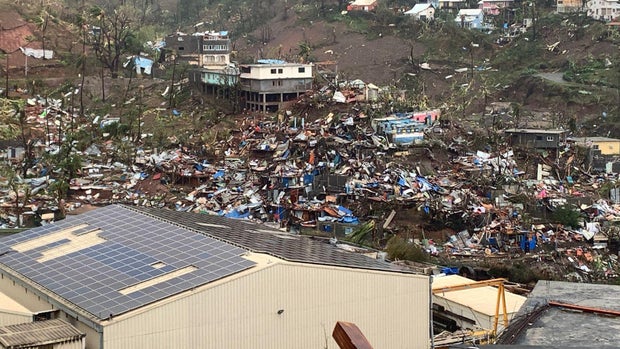CBS News
Second U.S. service member in months charged with rape in Japan’s Okinawa: “We are outraged”

Tokyo — Japan’s government protested Friday to the U.S. Embassy in Tokyo over at least two sexual assault cases involving American servicemembers on the southern Japanese island of Okinawa that were only recently made public.
In one case, an Air Force member is accused in March of assaulting a teenage girl in December, while the other, which dates from May, involves a Marine accused of assaulting a 21-year-old woman.
The case involving the assault of the teenager is a reminder to many Okinawans of the high-profile 1995 rape of a 12-year-old girl by three U.S. servicemembers, which sparked massive protests against the heavy U.S. troop presence on Okinawa. It led to a 1996 agreement between Tokyo and Washington on a closure of a key U.S. air station, though the plan has been delayed due to protests at the site designated for its relocation on another part of the island.
PHILIP FONG / AFP via Getty Images
Some 50,000 U.S. troops are deployed in Japan under a bilateral security pact, about half of them on Okinawa, whose strategic role is seen increasingly important for the Japan-U.S. military alliance in the face of growing tensions with China. Japan’s southwestern shift of its own military also focuses heavily on Okinawa and its nearby islands.
Chief Cabinet Secretary Yoshimasa Hayashi told reporters Friday it was “extremely regrettable” the two alleged sexual assaults occurred within months. Japan “takes it seriously” and Vice Foreign Minister Masataka Okano conveyed regrets to U.S. Ambassador to Japan Rahm Emanuel, requesting disciplinary and preventive measures, Hayashi said.
“I believe that the U.S. side also takes this matter seriously,” Hayashi said. “Criminal cases and accidents by U.S. military personnel cause great anxiety to local residents, and they should never occur in the first place.”
The U.S. Embassy in Tokyo declined to confirm details of the meeting between Emanuel and Okano and how the ambassador responded, citing diplomatic rules.
Hayashi said Japanese prosecutors in Naha, the capital of Okinawa, had pressed nonconsensual sex and assault charges against the Marine on June 17, which were only announced Friday. Both suspects were handled by the Japanese authorities.
An Okinawa police spokesperson told Agence France-Presse the Marine is accused of “assaulting the victim for the purpose of sexual intercourse and injuring her,” adding that, “The fact that he used violence for that purpose and wounded her constitutes non-consensual sex resulting in injury.”
The woman was “bitten in the mouth” and took two weeks to fully recover, he said. Media reports said she was also choked.
The two cases have sparked outrage and echo Japan’s fraught history with US troops, including the 1995 gang rape of a 12-year-old girl by three U.S. servicemen.
The Naha District Prosecutors’ Office refused to confirm indictments in the two cases over the phone with anyone who is not a local press club member. Okinawa prefectural police said the two cases were never made public out of consideration for the privacy of the victims.
Okinawa residents and the island’s governor, Denny Tamaki, have long complained about accidents and crime related to U.S military bases and expressed anger over the alleged crime and lack of disclosure.
Tamaki, who opposes the heavy U.S. troop presence on Okinawa, said he was “speechless and outraged.” He stressed the need to “reconstruct” the communication system in case of crime and accidents involving American service members.
“I’m deeply concerned about the severity of this allegation and I regret the anxiety this has caused,” Brig. Gen. Nicholas Evans, Commander of the 18th Wing at Kadena Air Base on Okinawa, who visited the Okinawa prefectural government with several U.S. officials, said on Thursday, though he did not apologize.
He promised the US military will fully cooperate with the investigation by the local authorities and the courts.
Okinawa Vice Gov. Takekuni Ikeda told Evans and other officials that the alleged assaults were serious human rights violations against women. “We find them absolutely unforgivable, and we are outraged,” he said.
Ikeda also protested the delayed notification of the criminal cases, saying they caused anxiety for residents near the U.S. bases. He said the prefecture was only notified this week about the December case, when the suspect was indicted in March, and only after inquiries by the Japanese Foreign Ministry.
CBS News
France’s President Emmanuel Macron tours cyclone-battered Mayotte, meets survivors pleading for help

Mamoudzou, Mayotte — France’s President Emmanuel Macron traveled Thursday to the Indian Ocean archipelago of Mayotte to survey the devastation that Cyclone Chido wrought across the French territory as thousands of people tried to cope without bare essentials such as water or electricity.
“Mayotte is demolished,” an airport security agent told Macron as soon as he stepped off the plane.
The security agent, Assane Haloi, said her family members, including small children, are without water or electricity and have nowhere to go after the strongest cyclone in nearly a century ripped through the French territory of Mayotte off the coast of Africa on Saturday.
KWEZI/AFP/Getty
“There’s no roof, there’s nothing. No water, no food, no electricity. We can’t even shelter, we are all wet with our children covering ourselves with whatever we have so that we can sleep,” she said, asking for emergency aid.
Macron got a helicopter tour of the damage and was to spend Thursday night on the far-flung French territory. After flying over the destruction, he headed to the hospital in Mamoudzou, Mayotte’s capital, to meet medical staff and patients.
Wearing a traditional Mayotte scarf on his white shirt and tie, sleeves rolled to the elbows, the French president listened to people asking for help. A member of the medical staff told him some people hadn’t had a drink of water for 48 hours.
Some residents also expressed agony at not knowing about those who have died or are still missing, partly because of the Muslim practice of burying the dead within 24 hours.
LUDOVIC MARIN/POOL/AFP/Getty
“We’re dealing with open-air mass graves,” Mayotte lawmaker Estelle Youssoufa told reporters. “There are no rescuers, no one has come to recover the buried bodies.”
Some survivors and aid groups have described hasty burials and the stench of bodies.
Macron acknowledged that many who died hadn’t been reported. He said phone services will be repaired “in the coming days” so that people can report their missing loved ones.
French authorities have said at least 31 people died and more than 1,500 people were injured, more than 200 critically. But it’s feared hundreds or even thousands of people have died in total.
Abdou Houmadou, 27, said emergency aid was needed immediately, not Macron’s presence.
“Mr. President, what I’d like to tell you… is I think the spending you made from Paris to Mayotte would have been better spent to help the people,” he said.
Another resident, Ahamadi Mohammed, said Macron’s visit “is a good thing because he’ll be able to see by himself the damage.”
“I think that we’ll then get significant aid to try and get the island back on its feet,” the 58-year-old said.
LUDOVIC MARIN/POOL/AFP/Getty
Macron’s office said four tons of food and medical aid, as well as additional rescuers, were aboard the president’s flight. A navy ship was due to arrive in Mayotte on Thursday with another 180 tons of aid and equipment, according to the French military.
People living in a large slum on the outskirts of Mamoudzou were some of the hardest hit by the cyclone. Many lost their houses, some lost friends.
Nassirou Hamidouni sheltered in his house when the cyclone hit.
His neighbor was killed when his house collapsed on him and his six children. Hamidouni and others dug through the rubble to reach them.
The 28-year-old father of five is now trying to rebuild his own house, which was also destroyed.
He believes the death toll is much higher than what’s officially being reported, given the severity of what he lived through.
“It was very hard,” he said.
Mayotte, located in the Indian Ocean between mainland Africa’s east coast and northern Madagascar, is France’s poorest territory.
The cyclone devastated entire neighborhoods and many people ignored the warnings, thinking the storm wouldn’t be so extreme.
Mayotte has more than 320,000 residents according to the French government. Most are Muslim and French authorities have estimated another 100,000 migrants live there.
Mayotte is the only part of the Comoros archipelago that voted to remain a part of France in a 1974 referendum.
Over the last decade, the French territory has seen a massive influx of migrants from the neighboring islands – the independent nation of Comoros, which is one of the world’s poorest countries.
CBS News
Google Maps helps solve murder mystery by capturing moment a person put suspected corpse into car in Spain

Google Maps has guided Spanish investigators to resolve a year-long murder mystery by capturing the moment a person stowed a suspected corpse into a car.
Police in the northern region of Castile and Leon began their probe in November 2023 when someone reported the disappearance of a male relative.
Officers arrested a woman who was the missing male’s partner and another man who was her ex-partner in Soria province on November 12, police said in a statement on Wednesday.
Investigators then raided the suspects’ homes and inspected their vehicles but also stumbled on an unexpected lead in the search for further clues.
These were “images in a location application” where they “detected a vehicle that may have been used during the course of the crime,” the statement said.
Spanish media circulated pictures of a screenshot of Google Maps’ Street View from October 2024 showing a person dumping an object covered in a white shroud into a car trunk in the village of Tajueco. It was the first time in 15 years that the car had been to the town of Tajueco, the BBC reported.
The images contributed to resolving the case, though they were not “decisive,” police said.
Officials said another photo sequence shows the blurred silhouette of someone transporting a large white bundle in a wheelbarrow, the BBC reported.
The central government’s representative in Soria, Miguel Latorre, told public broadcaster RTVE the person “can presumably be” considered the culprit.
Police said a severely decomposed human torso believed to belong to the victim had been found this month in a cemetery in Soria province. El Pais daily reported that he was a 33-year-old Cuban.
A judge has ordered the suspects into custody and the investigation remains open.
This marks at least the second time that Google technology has helped crack a cold case. In 2019, the remains of a man missing for 22 years were finally found thanks to someone who zoomed in on his former Florida neighborhood with Google satellite images and noticed a car submerged in a lake.
CBS News
2 soldiers killed by landmine blast in Mexico day after 2 troops killed by booby trap in same region

A blast killed two Mexican soldiers in the second deadly incident this week involving an improvised landmine in a crime-plagued western state, authorities said Wednesday.
According to the El Universal newspaper, the soldiers were trying to deactivate the device when it exploded.
The blast happened late on Tuesday in Buenavista in Michoacan, the state prosecutor’s office said.
A military source who did not want to be named said that troops were looking for similar devices believed to have been planted in the area.
On Monday, a blast caused by another improvised landmine killed two Mexican soldiers and wounded five others in the same region. Before the explosion, the soldiers had discovered the dismembered bodies of three people, officials said.
The device was suspected to have been planted by members of a local criminal group waging a turf war with a bigger drug cartel, Defense Minister Ricardo Trevilla said Tuesday.
Six other soldiers had been killed by similar improvised devices since late 2018, he said.
Mexico is plagued by widespread drug-related violence that has seen more than 450,000 people killed since the government deployed the army to combat trafficking in 2006, according to official figures.
In the only previous detailed report on cartel bomb attacks in August 2023, the defense department said at that time that a total of 42 soldiers, police and suspects were wounded by IEDs in the first seven and a half months of 2023, up from 16 in all of 2022.
Overall, 556 improvised explosive devices of all types – roadside, drone-carried and car bombs – were found in 2023, the army said in a news release last year.











